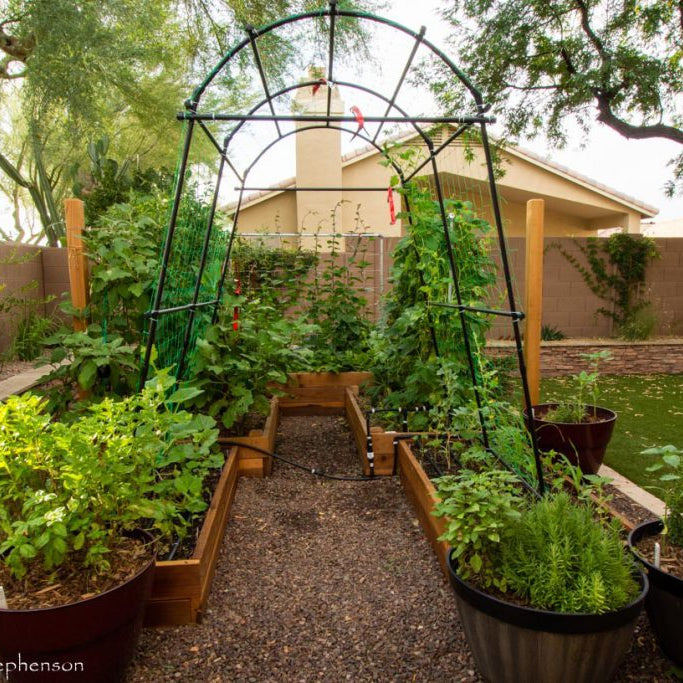

Worried of Snakes ? Top 30 Powerful Plants that Repel Snakes Away
Snakes: the slippery, slithering creatures that can give even the bravest among us a case of the heebie-jeebies. If you're keen to keep these legless wonders out of your garden or backyard, we've got just the solution for you.

Forget about those snake repellent sprays that leave you smelling like a walking chemical factory. It's time to embrace the power of nature and arm yourself with the top plants that will make snakes slither away faster than you can say "hiss"!
Here are the top 30 plants to make snake-free garden:
-
Marigolds: These cheerful flowers emit a pungent aroma that snakes find repulsive, making them an effective snake deterrent. Plant marigolds around your garden borders or near entry points to keep snakes at bay.

-
Mother-in-Law's Tongue (Snake Plant): With its long, sharp leaves, the Mother-in-Law's Tongue acts as a natural deterrent for snakes. This spiky plant adds an architectural element to your space while keeping unwanted slithering visitors away.
-
Lemongrass: The citrusy scent of lemongrass plants is enough to send snakes slithering in the opposite direction. Plant lemongrass in containers or create a lemongrass barrier around your garden or patio to deter snakes.

-
Garlic: The pungent aroma of garlic is disliked by snakes, making it an effective natural snake deterrent. Plant garlic bulbs around your garden or create a garlic-infused spray to keep snakes away.
-
Indian Snakeroot: This herbaceous perennial emits a strong odor that repels snakes, making it a must-have in your anti-snake arsenal. Plant Indian Snakeroot around your garden to deter snakes from entering your space.
-
Wormwood: In addition to its bitter taste, wormwood releases a strong aroma that snakes find quite off-putting. Plant wormwood around your garden or create sachets with dried wormwood to repel snakes.
-
West Indian Lemongrass: Similar to lemongrass, this variety boasts a refreshing citrus scent that snakes find repulsive. Plant West Indian Lemongrass in your garden or use its essential oil to create a snake-repelling barrier.
-
Tulbaghia Violacea (Society Garlic): This herb has a strong garlic-like smell that snakes dislike, making it an effective snake repellent. Plant Society Garlic around your garden beds or near entry points to deter snakes from slithering in.
-
Onions: The pungent scent of onions can keep snakes at bay, making them a natural snake deterrent. Plant onion bulbs or scatter chopped onions around your garden to create a snake-repelling barrier.
-
Naphthelene Balls: These old-school mothballs release a strong odor that snakes can't stand, making them an effective snake repellent. Place naphthalene balls around snake-prone areas or use them in breathable bags to keep snakes away.
-
Rosemary: This aromatic herb not only adds flavor to dishes but also acts as a natural snake deterrent with its strong scent. Plant rosemary bushes near entrances or use dried rosemary as a natural snake-repelling mulch.

-
Lavender: Known for its calming fragrance, lavender also has properties that snakes find repulsive. Plant lavender bushes or use dried lavender sachets near potential snake entry points to discourage their presence.
-
Mint: The refreshing scent of mint is delightful to us but repels snakes. Plant mint in containers or create a mint border around your garden to deter snakes from slithering in.
-
Wormwood: This herb has a bitter taste and releases a strong scent that snakes find quite off-putting. Plant wormwood around your garden or create sachets with dried wormwood to repel snakes.
-
Fennel: Fennel not only adds a sweet and anise-like flavor to dishes but also acts as a natural snake repellent. Plant fennel near entrances or scatter fennel seeds around your garden to deter snakes.
-
Onion chives: Similar to onions, the pungent scent of onion chives can keep snakes at bay. Plant onion chives in your garden or create a chive border to repel snakes.
-
Geraniums: The vibrant colors and pleasant scent of geraniums make them a popular choice for gardens. Interestingly, their fragrance also has a repelling effect on snakes. Plant geraniums in containers or along garden paths to deter snakes.

-
Sage: Known for its culinary uses, sage also has the added benefit of being a natural snake deterrent. Plant sage near entrances or use dried sage as a natural snake-repelling mulch.
-
Thyme: This aromatic herb not only adds flavor to dishes but also has properties that make it unappealing to snakes. Plant thyme near entrances or use dried thyme as a natural snake-repelling mulch.
-
Garlic chives: The scent of garlic chives is a strong deterrent for snakes. Plant garlic chives near entrances or create a chive border to repel snakes.
-
Catnip: While it may attract cats, catnip has the opposite effect on snakes. Its strong scent is highly disliked by snakes, making it an effective natural repellent. Plant catnip in containers or along garden borders to keep snakes away.
-
Eucalyptus: The distinct aroma of eucalyptus leaves is not only refreshing but also repels snakes. Plant eucalyptus trees or use eucalyptus oil to create a snake-repelling barrier.
-
Tulsi (Holy Basil): Considered sacred in many cultures, tulsi emits a strong scent that snakes find displeasing. Plant tulsi near entrances or use dried tulsi leaves near snake-prone areas to repel snakes.

-
Alliums (Onions, Garlic, Shallots): Plants from the allium family, including onions, garlic, and shallots, are known for their pungent smell that snakes dislike. Plant various allium species to create a snake-repelling effect.
-
Wintergreen: The strong minty aroma of wintergreen plants can help keep snakes away. Plant wintergreen shrubs or use wintergreen oil as a natural snake repellent.
-
Citronella: Known for its mosquito-repelling properties, citronella also has a deterring effect on snakes. Plant citronella grass or use citronella oil as a natural snake repellent.
-
Narcissus: These beautiful flowers not only add charm to your garden but also repel snakes. Plant narcissus bulbs in your garden beds or near entry points to discourage snakes.
-
Oleander: While toxic to humans and animals if ingested, the strong scent of oleander serves as a deterrent to snakes. Plant oleander shrubs at the perimeter of your property to discourage snake activity.
-
Cinnamon: Snakes dislike the smell of cinnamon. Sprinkle cinnamon powder or use cinnamon essential oil around snake-prone areas to create a snake-repelling barrier.
-
Pennyroyal: Pennyroyal is an herb that emits a strong minty scent that snakes find unpleasant. Plant pennyroyal around your garden or use dried pennyroyal leaves near snake entry points.
These plants offer a variety of scents and characteristics that snakes find unpleasant, helping to deter them from your garden or outdoor areas. By strategically incorporating these plants, you can create a more snake-free environment.
Remember to consider factors such as climate, growing conditions, and any potential risks associated with specific plants before introducing them to your space.
Plants repel snakes through various mechanisms, including scent, texture, and chemical properties.
Here are a few ways in which plants repel snakes:
-
Strong scents: Many plants release strong scents that snakes find repulsive. These scents can mimic predator odors or simply be unpleasant to snakes. Plants like marigolds, garlic, onions, and lemongrass emit powerful odors that deter snakes from entering an area.
-
Pungent tastes: Some plants, such as wormwood and sage, have bitter tastes that snakes avoid. Snakes rely on their sense of taste to explore their surroundings, and when they encounter plants with unpleasant tastes, they tend to move away.
-
Spiky or rough textures: Plants with spiky or rough leaves, like mother-in-law's tongue (snake plant), can deter snakes by creating an uncomfortable surface. Snakes prefer smooth surfaces for easy movement and may avoid areas with plants that impede their slithering.
-
Toxicity: Certain plants produce toxins that are harmful or even deadly to snakes. For example, oleander contains toxins that can repel and potentially harm snakes. However, it's important to note that while these plants may deter snakes, they can also pose risks to humans and other animals.
-
Competition and habitat modification: Some plants indirectly repel snakes by altering their habitat or attracting predators of snakes. For instance, planting tall grasses or dense vegetation can create an environment that is less attractive to snakes, as it limits their ability to move around freely.
-
Visual deterrents: Plants with bright colors or patterns may discourage snakes, as they can mimic the appearance of venomous or dangerous species. Snakes have evolved to recognize and avoid these warning signals, reducing the likelihood of confrontation.
Related Products
-
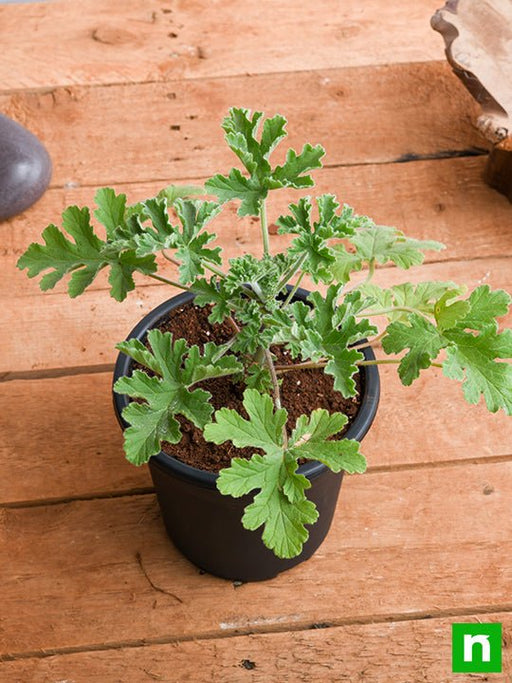
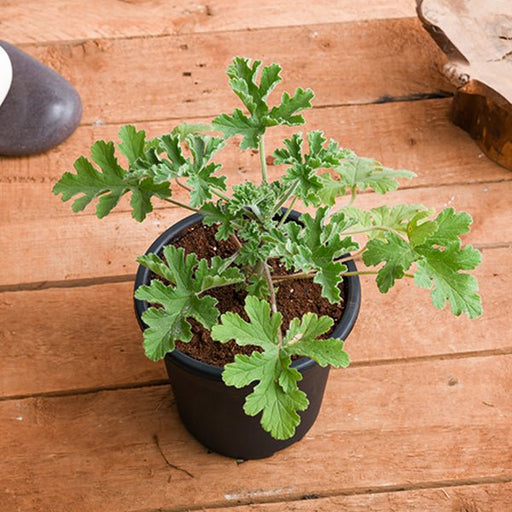 Sold out
Original price ₹ 298Original price ₹ 298Original price ₹ 298Current price ₹ 259₹ 259Current price ₹ 259
Sold out
Original price ₹ 298Original price ₹ 298Original price ₹ 298Current price ₹ 259₹ 259Current price ₹ 259Citronella, Odomas - Plant
Citronella, Odomas - Plant The Citronella plant, scientifically known as Cymbopogon nardus, is a tropical grass renowned for its aromatic ...
View full detailsOriginal price ₹ 298Original price ₹ 298Original price ₹ 298Current price ₹ 259₹ 259Current price ₹ 259Sold out -
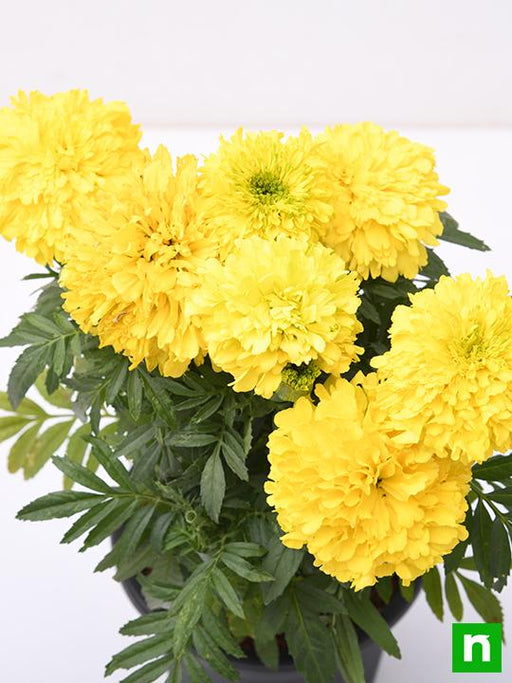
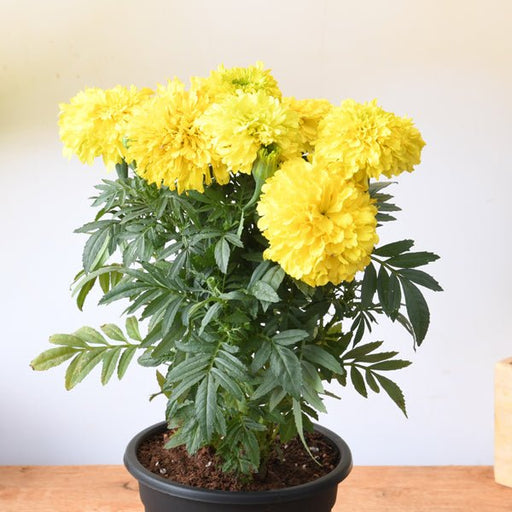 Save 12%
Original price ₹ 329Original price ₹ 329Original price ₹ 329Current price ₹ 289₹ 289Current price ₹ 289
Save 12%
Original price ₹ 329Original price ₹ 329Original price ₹ 329Current price ₹ 289₹ 289Current price ₹ 289African Marigold (Any Color) - Plant
African Marigold (Any Color) - Plant The African Marigold, known scientifically as *Tagetes erecta*, is a vibrant and hardy flowering plan...
View full detailsOriginal price ₹ 329Original price ₹ 329Original price ₹ 329Current price ₹ 289₹ 289Current price ₹ 289Save 12%
You may like this Collection
-
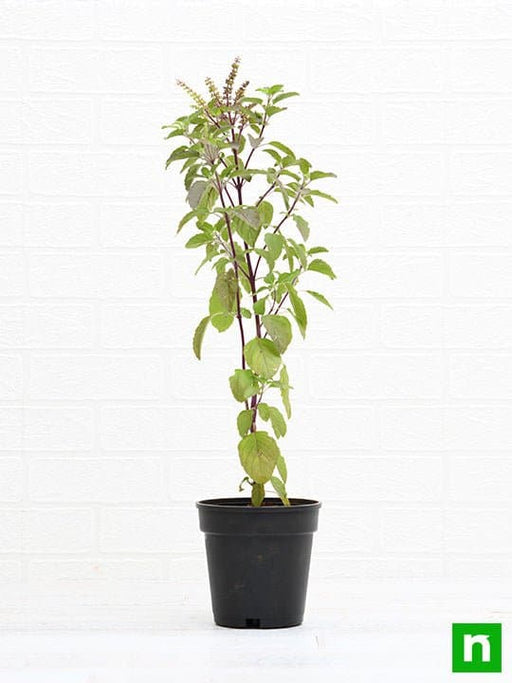
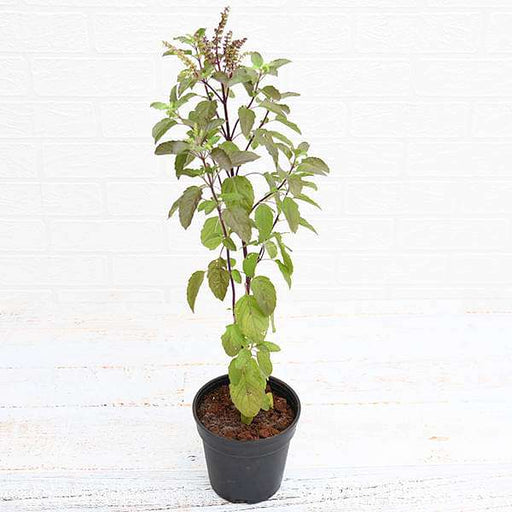 Save 26%
Original price ₹ 349Original price ₹ 349Original price ₹ 349Current price ₹ 259₹ 259Current price ₹ 259
Save 26%
Original price ₹ 349Original price ₹ 349Original price ₹ 349Current price ₹ 259₹ 259Current price ₹ 259Krishna Tulsi Plant, Holy Basil, Ocimum tenuiflorum (Black) - Plant
Krishna Tulsi Plant, Holy Basil, Ocimum tenuiflorum (Black) - Plant The Krishna Tulsi Plant, also known as Holy Basil, is a revered herb i...
View full detailsOriginal price ₹ 349Original price ₹ 349Original price ₹ 349Current price ₹ 259₹ 259Current price ₹ 259Save 26% -
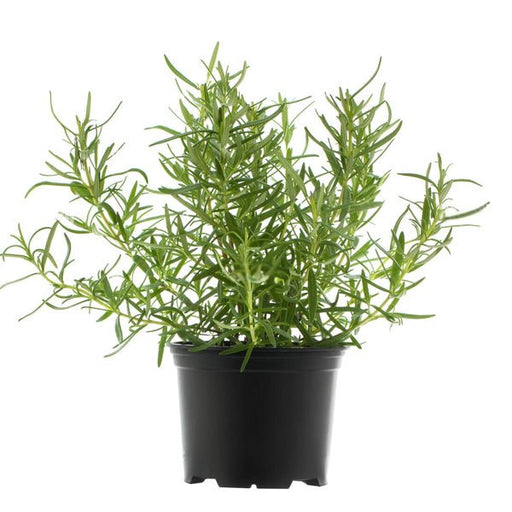 Save 26%
Original price ₹ 349Original price ₹ 349Original price ₹ 349Current price ₹ 259₹ 259Current price ₹ 259
Save 26%
Original price ₹ 349Original price ₹ 349Original price ₹ 349Current price ₹ 259₹ 259Current price ₹ 259Rosemary - Plant
Rosemary - Plant Rosemary (Rosmarinus officinalis) is a fragrant evergreen herb native to the Mediterranean region. Known for its needle-like leav...
View full detailsOriginal price ₹ 349Original price ₹ 349Original price ₹ 349Current price ₹ 259₹ 259Current price ₹ 259Save 26% -
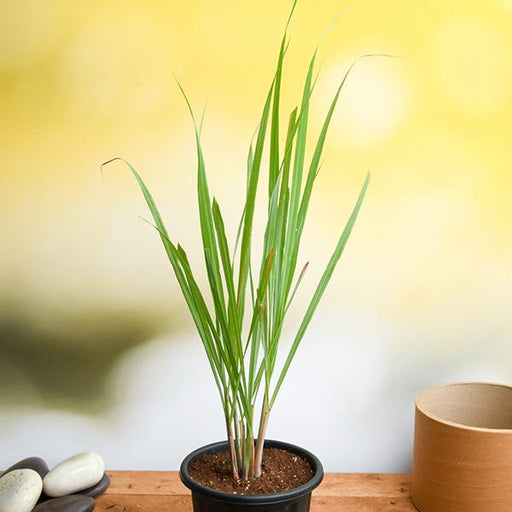
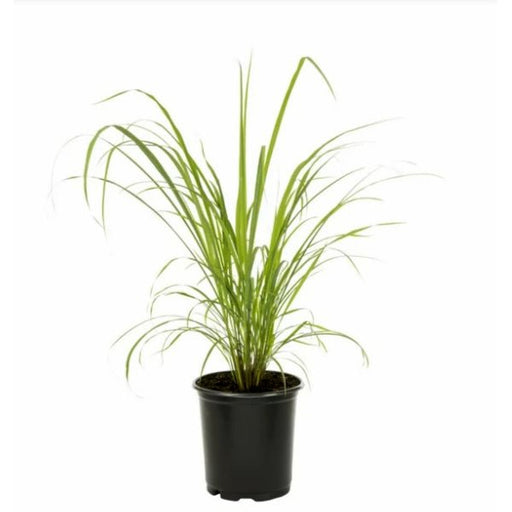 Save 26%
Original price ₹ 349Original price ₹ 349Original price ₹ 349Current price ₹ 259₹ 259Current price ₹ 259
Save 26%
Original price ₹ 349Original price ₹ 349Original price ₹ 349Current price ₹ 259₹ 259Current price ₹ 259Lemon Grass - Plant
Lemon Grass - Plant Lemon Grass (Cymbopogon citratus) is a tropical perennial grass known for its aromatic leaves and culinary versatility. This v...
View full detailsOriginal price ₹ 349Original price ₹ 349Original price ₹ 349Current price ₹ 259₹ 259Current price ₹ 259Save 26% -

 Sold out
Original price ₹ 298Original price ₹ 298Original price ₹ 298Current price ₹ 259₹ 259Current price ₹ 259
Sold out
Original price ₹ 298Original price ₹ 298Original price ₹ 298Current price ₹ 259₹ 259Current price ₹ 259Citronella, Odomas - Plant
Citronella, Odomas - Plant The Citronella plant, scientifically known as Cymbopogon nardus, is a tropical grass renowned for its aromatic ...
View full detailsOriginal price ₹ 298Original price ₹ 298Original price ₹ 298Current price ₹ 259₹ 259Current price ₹ 259Sold out -
View all Collection
Related Collections
Best Sellers
-
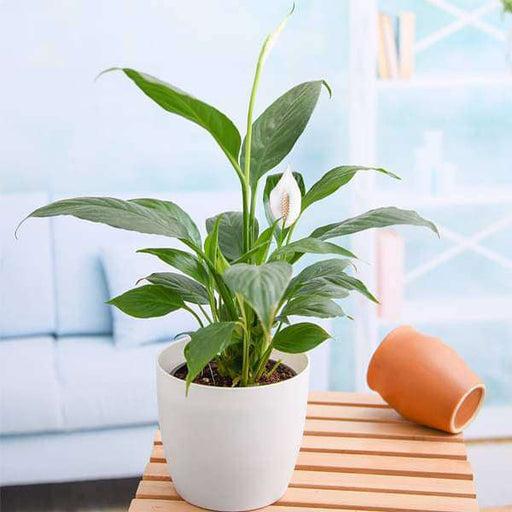
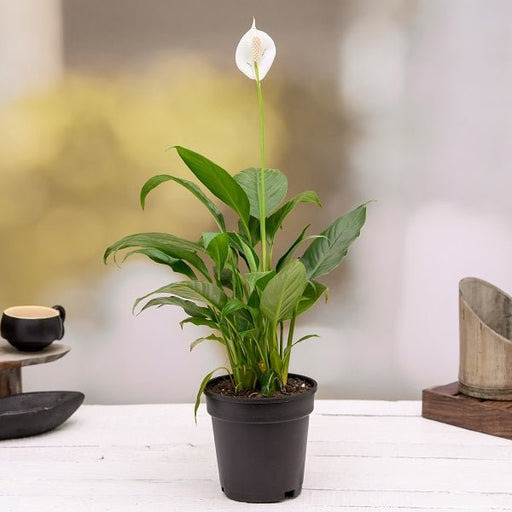 Save up to 15%
Original price ₹ 249Original price ₹ 249Original price ₹ 249₹ 199₹ 199Current price ₹ 199
Save up to 15%
Original price ₹ 249Original price ₹ 249Original price ₹ 249₹ 199₹ 199Current price ₹ 199Peace Lily, Spathiphyllum - Plant
Peace Lily, Spathiphyllum - Plant The Peace Lily, scientifically known as Spathiphyllum, is a stunning houseplant celebrated for its elegant white...
View full detailsOriginal price ₹ 249Original price ₹ 249Original price ₹ 249₹ 199₹ 199Current price ₹ 199Save up to 15% -

 Save 18%
Original price ₹ 439Original price ₹ 439Original price ₹ 439Current price ₹ 359₹ 359Current price ₹ 359
Save 18%
Original price ₹ 439Original price ₹ 439Original price ₹ 439Current price ₹ 359₹ 359Current price ₹ 359Parijat Tree, Parijatak, Night Flowering Jasmine - Plant
Combo Constituents Includes the Parijat Tree (Night-Flowering Jasmine), a culturally significant plant with fragrant flowers. Description The Pari...
View full detailsOriginal price ₹ 439Original price ₹ 439Original price ₹ 439Current price ₹ 359₹ 359Current price ₹ 359Save 18% -
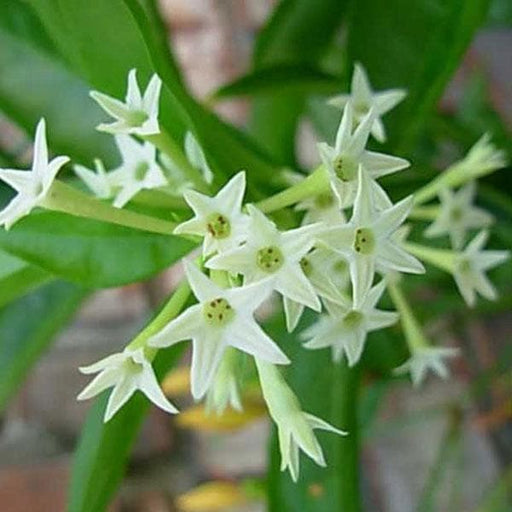
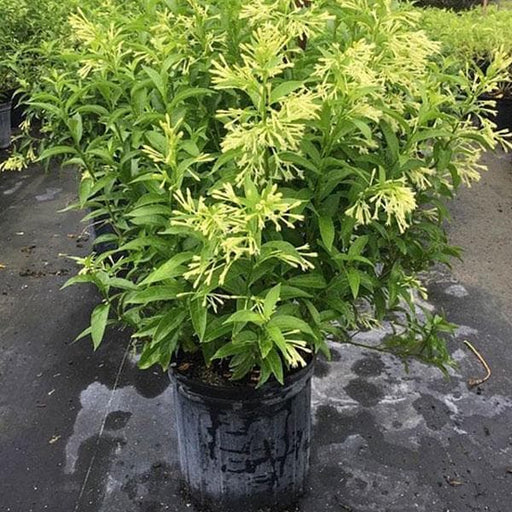 Save 25%
Original price ₹ 399Original price ₹ 399Original price ₹ 399Current price ₹ 299₹ 299Current price ₹ 299
Save 25%
Original price ₹ 399Original price ₹ 399Original price ₹ 399Current price ₹ 299₹ 299Current price ₹ 299Raat Ki Rani, Raat Rani, Night Blooming Jasmine - Plant
Description Raat Ki Rani (*Cestrum nocturnum*), also known as Night Blooming Jasmine, is a fragrant shrub native to the Caribbean and Central Ameri...
View full detailsOriginal price ₹ 399Original price ₹ 399Original price ₹ 399Current price ₹ 299₹ 299Current price ₹ 299Save 25% -

 Save 25%
Original price ₹ 399Original price ₹ 399Original price ₹ 399Current price ₹ 299₹ 299Current price ₹ 299
Save 25%
Original price ₹ 399Original price ₹ 399Original price ₹ 399Current price ₹ 299₹ 299Current price ₹ 299Jasminum sambac, Mogra, Arabian Jasmine - Plant
Jasminum sambac, Mogra, Arabian Jasmine - Plant Jasminum sambac, commonly known as Mogra or Arabian Jasmine, is a fragrant flowering plant...
View full detailsOriginal price ₹ 399Original price ₹ 399Original price ₹ 399Current price ₹ 299₹ 299Current price ₹ 299Save 25% -
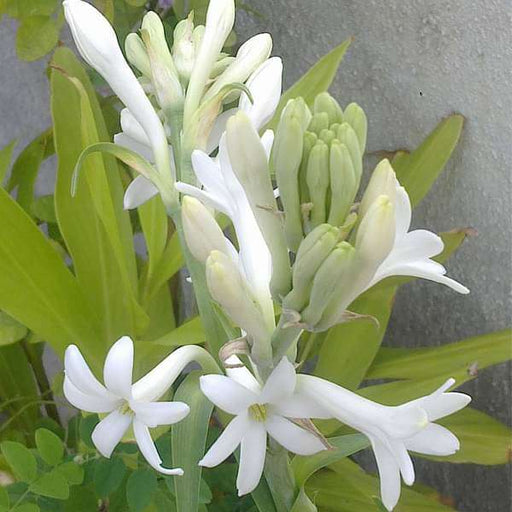
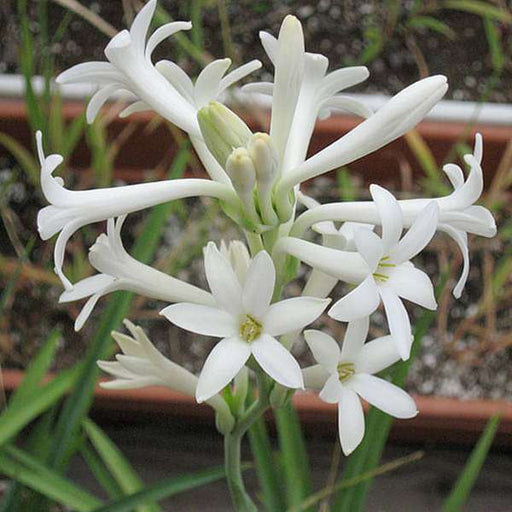 Save 17%
Original price ₹ 299Original price ₹ 299Original price ₹ 299Current price ₹ 249₹ 249Current price ₹ 249
Save 17%
Original price ₹ 299Original price ₹ 299Original price ₹ 299Current price ₹ 249₹ 249Current price ₹ 249Rajnigandha, Tuberose - Plant
Rajnigandha, Tuberose - Plant The Rajnigandha, scientifically known as Polianthes tuberosa, is a captivating perennial plant renowned for ...
View full detailsOriginal price ₹ 299Original price ₹ 299Original price ₹ 299Current price ₹ 249₹ 249Current price ₹ 249Save 17% -

 Sold out
Original price ₹ 298Original price ₹ 298Original price ₹ 298Current price ₹ 259₹ 259Current price ₹ 259
Sold out
Original price ₹ 298Original price ₹ 298Original price ₹ 298Current price ₹ 259₹ 259Current price ₹ 259Citronella, Odomas - Plant
Citronella, Odomas - Plant The Citronella plant, scientifically known as Cymbopogon nardus, is a tropical grass renowned for its aromatic ...
View full detailsOriginal price ₹ 298Original price ₹ 298Original price ₹ 298Current price ₹ 259₹ 259Current price ₹ 259Sold out -
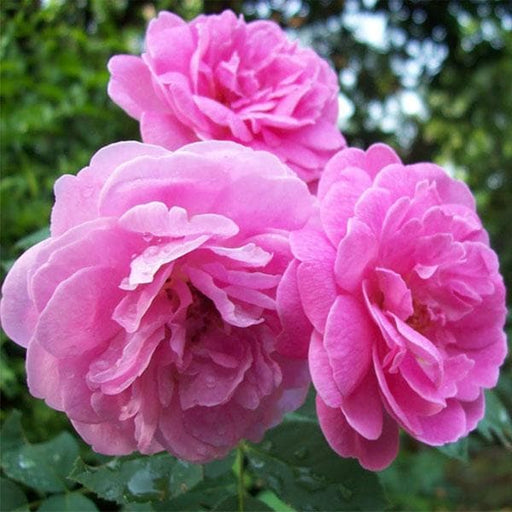 Save 25%
Original price ₹ 399Original price ₹ 399Original price ₹ 399Current price ₹ 299₹ 299Current price ₹ 299
Save 25%
Original price ₹ 399Original price ₹ 399Original price ₹ 399Current price ₹ 299₹ 299Current price ₹ 299Damascus Rose, Scented Rose (Any Color) - Plant
Damascus Rose, Scented Rose (Any Color) - Plant The Damascus Rose, also known as Rosa damascena, is a timeless symbol of beauty and romanc...
View full detailsOriginal price ₹ 399Original price ₹ 399Original price ₹ 399Current price ₹ 299₹ 299Current price ₹ 299Save 25% -
View all Collection
Save 50% with Packs
-

 Save 35%
Original price ₹ 1,739Original price ₹ 1,739Original price ₹ 1,739Current price ₹ 1,130₹ 1,130Current price ₹ 1,130
Save 35%
Original price ₹ 1,739Original price ₹ 1,739Original price ₹ 1,739Current price ₹ 1,130₹ 1,130Current price ₹ 1,130Best 6 Plants for Perfect Indoor Garden
Best 6 Plants for Perfect Indoor Garden Transform your living space into a lush oasis with our curated collection of the Best 6 Plants for a...
View full detailsOriginal price ₹ 1,739Original price ₹ 1,739Original price ₹ 1,739Current price ₹ 1,130₹ 1,130Current price ₹ 1,130Save 35% -

 Save up to 50%
Original price ₹ 829Original price ₹ 829Original price ₹ 829₹ 499₹ 499Current price ₹ 499
Save up to 50%
Original price ₹ 829Original price ₹ 829Original price ₹ 829₹ 499₹ 499Current price ₹ 499Mini Succulent Garden Pack
Mini Succulent Garden Pack Transform your space with our Mini Succulent Garden Pack, featuring a delightful collection of 4 any variety beautiful s...
View full detailsOriginal price ₹ 829Original price ₹ 829Original price ₹ 829₹ 499₹ 499Current price ₹ 499Save up to 50% -

 Save 30%
Original price ₹ 2,142Original price ₹ 2,142Original price ₹ 2,142Current price ₹ 1,499₹ 1,499Current price ₹ 1,499
Save 30%
Original price ₹ 2,142Original price ₹ 2,142Original price ₹ 2,142Current price ₹ 1,499₹ 1,499Current price ₹ 1,4995 Best Fragrant Plants
5 Best Fragrant Plants Transform your garden or indoor space into a fragrant paradise with our curated selection of the 5 Best Fragrant Plants. Th...
View full detailsOriginal price ₹ 2,142Original price ₹ 2,142Original price ₹ 2,142Current price ₹ 1,499₹ 1,499Current price ₹ 1,499Save 30% -

 Save 24%
Original price ₹ 998Original price ₹ 998Original price ₹ 998Current price ₹ 759₹ 759Current price ₹ 759
Save 24%
Original price ₹ 998Original price ₹ 998Original price ₹ 998Current price ₹ 759₹ 759Current price ₹ 759Set of 2 Bonsai Looking Grafted Adeniums
Set of 2 Bonsai Looking Grafted Adeniums Transform your indoor or outdoor space with our exquisite Set of 2 Bonsai Looking Grafted Adenium...
View full detailsOriginal price ₹ 998Original price ₹ 998Original price ₹ 998Current price ₹ 759₹ 759Current price ₹ 759Save 24% -
 Save 45%
Original price ₹ 1,014Original price ₹ 1,014Original price ₹ 1,014Current price ₹ 559₹ 559Current price ₹ 559
Save 45%
Original price ₹ 1,014Original price ₹ 1,014Original price ₹ 1,014Current price ₹ 559₹ 559Current price ₹ 559Top 4 Die Hard Succulents Pack
Top 4 Die Hard Succulents Pack Transform your indoor or outdoor space with our Top 4 Die Hard Succulents Pack, featuring a curated selecti...
View full detailsOriginal price ₹ 1,014Original price ₹ 1,014Original price ₹ 1,014Current price ₹ 559₹ 559Current price ₹ 559Save 45% -

 Save 30%
Original price ₹ 1,905Original price ₹ 1,905Original price ₹ 1,905Current price ₹ 1,334₹ 1,334Current price ₹ 1,334
Save 30%
Original price ₹ 1,905Original price ₹ 1,905Original price ₹ 1,905Current price ₹ 1,334₹ 1,334Current price ₹ 1,3345 Best Indoor Plants Pack
5 Best Indoor Plants Pack Transform your living space into a lush oasis with our '5 Best Indoor Plants Pack.' This carefully curated collection fe...
View full detailsOriginal price ₹ 1,905Original price ₹ 1,905Original price ₹ 1,905Current price ₹ 1,334₹ 1,334Current price ₹ 1,334Save 30% -

 Save 25%
Original price ₹ 1,296Original price ₹ 1,296Original price ₹ 1,296Current price ₹ 972₹ 972Current price ₹ 972
Save 25%
Original price ₹ 1,296Original price ₹ 1,296Original price ₹ 1,296Current price ₹ 972₹ 972Current price ₹ 972Set of 4 Evergreen Air Purifier Plant Pack
Set of 4 Evergreen Air Purifier Plant Pack Transform your indoor space into a lush, green oasis with our Set of 4 Evergreen Air Purifier Pla...
View full detailsOriginal price ₹ 1,296Original price ₹ 1,296Original price ₹ 1,296Current price ₹ 972₹ 972Current price ₹ 972Save 25% -
View all Collection
















































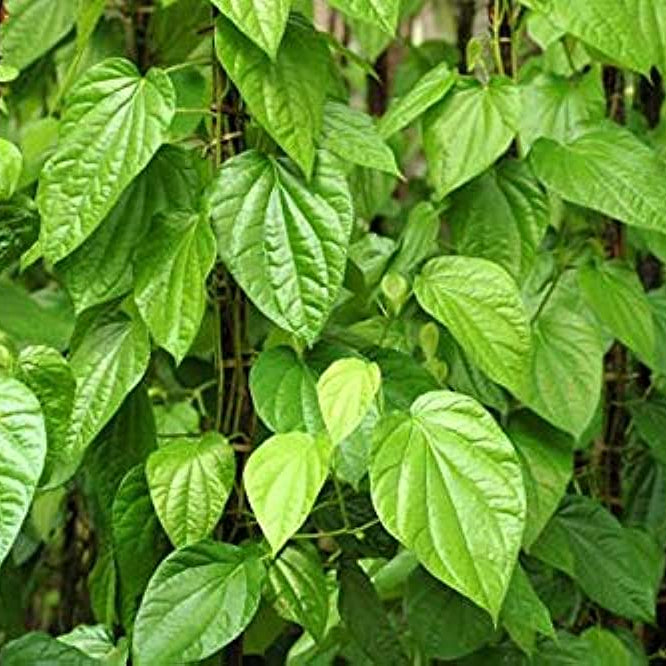








Leave a comment